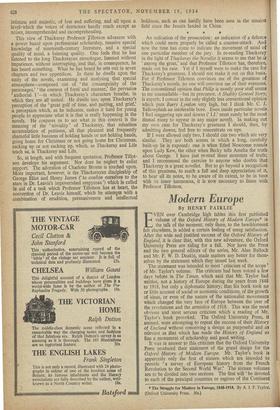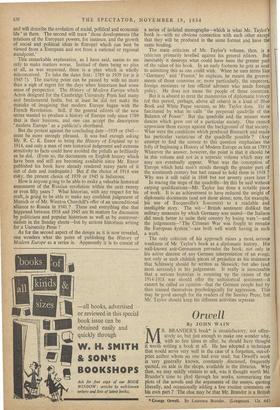Modern Europe
By HENRY FAIRLIE -F i VEN over Cambridge high tables this first published volume of the Oxford History of Modern Europe* is felt elsewhere, is added a certain feeling of smug satisfaction. After the wide and justified success of the Oxford History of England, it is clear that, with this new adventure, the Oxford University Press are riding for a fall. Nor have the Press and the two general editors of the series, Mr. Alan Bullock and Mr. F. W. D. Deakin, made matters any better for them- selves by the statement which they issued last week.
The statement was intended to meet ' criticism of the scope' of Mr. Taylor's volume. The criticism had been voiced a few days before in The Tin:es, which said that Mr. Taylor had written, not a history of Europe during the years from 1848 to 1918, but only a diplomatic history; that his book took no or little account of social or economic conditions, of the growth of ideas, or even of the nature of the nationalist movements which changed the very face of Europe between the year of the revolutions and the armistice of 1918. This was the most obvious and most serious criticism which a reading pf Mr. Taylor's book provoked. The Oxford University Press, it seemed. were attempting to repeat the success of their History of England without conceiving a design as purposeful and as relevant as that which has made the History of England so fine a monument of scholarship and good writing.
It was in answer to this, criticism that the Oxford University Press produced their statement of the grand design for the Oxford History of Modern Europe. Mr. Taylor's book is apparently only the first of sixteen which are intended to provide ' a survey of European history from the French Revolution to the Second World War.' The sixteen volumes are to be divided into two sections. The first will ' be devoted to each of the principal countries or regions of the Continent
*The Struggle for Mastery in Europe, 1848-1918. By A. J. P. Taylor. (Oxford University Press. 30s.)
the talk of the moment; only there, to the bewilderment and will describe the evolution of social, political and economic life' in them. The second will trace ' those developments (the relations of the European powers, for instance, and the growth of social and political ideas in Europe) which can best be viewed from a European and not from a national or regional standpoint.'
This remarkable explanation, as I have said, seems to me only to make matters worse. Instead of there being no plan at all, as was suspected, there is a plan which is wholly misconceived. To take the dates first: 1789 to 1939 (or is it 1945 ?). The starting point can be passed by with no more than a sigh of regret for the days when historians had some sense of perspective. The History of Modern Europe which Acton designed for the Cambridge University Press had many and fundamental faults, but at least he did not make the mistake of. imagining that modern Europe began with the French Revolution. Still, if the general editors of the new series wanted to produce a history of Europe only since 1789 that is their business, and one can accept the description ' modern Europe ' as a publicist's shorthand.
But the protest against the concluding date-1939 or 1945— must be more strongly phrased. It was bad enough asking Mr. R. C. K. Ensor to bring the History of England up to 1914, and only a man of rare historical judgement and extreme sensitivity to facts could have avoided the pitfalls as brilliantly as he did. (Even so, the documents on English history which have been and still are becoming available since Mr. Ensor published his book have already rendered many parts of it out of date and inadequate.) But if the choice of 1914 was risky, the present choice of 1939 or 1945 is ludicrous: How is anyone going to be able to make a valuable historical assessment of the Russian revolution within the next twenty or even fifty years ? What historian, with any respect for his craft,.is going to be able to make any confident judgement of Munich or of Mr. Winston Churchill's offer of an unconditional alliance to Russia in 1941 ? These and everything else that happened between 1918 and 1945 are fit matters for discussion by politicians and popular historians as well as by controver- sialists in the Sunday sheets—but by serious historians writing fora University Press ?
As for the second aspect of the design as it is now revealed, one wonders what the point of publishing the History of Modern Europe as a series is. Apparently it is to consist of a series of isolated monographs—which is what Mr. Taylor's book is—with no obvious connection with each other except that they will be produced in the same format and have the same binding.
The main criticism of Mr. Taylor's volume, then, is a criticism primarily levelled against his general editors. But inevitably it destroys what could have been the greater part of the value of his book. In an early footnote he gets as near to admitting this as one could wish. When he uses terms like Germany' and France,' he explains, he means the govern- ments of those countries or, more particularly, the emperors, foreign ministers or less official advisers who made foreign policy. He does not mean the people of those countries.
But it is absurd to treat the manoeuvres of diplomatic history (of this period, perhaps, above all others) in a kind of Blue Book and White Paper vacuum, as Mr. Taylor does. He is fascinated by what he calls the perpetual quadrille of the Balance of Power.' But the quadrille and the minuet were dances which grew out of a particular society. One cannot appreciate them except against the background of that society. What were the conditions which produced Bismarck and made his particular variations of the quadrille possible ? (Any attempt to find the answer to this question emphasises the folly of beginning a History of Modern Europe as late as 1789.) Whatever the answer, however, the point is that it should ho in this volume and not in a separate volume which may or may not eventually appear. What was the conception of Europe which held men's minds through the greater part of the nineteenth century but had ceased to hold them in 1918 ? Why was it still valid in 1848 but not seventy years later ?
In tracing the steps of the quadrille—let this be said without carping qualifications—Mr. Taylor has done a notable piece of work. It is an achievement to have reduced the weight of diplomatic documents (and not those alone; note, for example, his use of Tocqueville's Souvenirs) to a readable and intelligible story. The wit—' British sentiment disliked the military measures by which Germany was united—the Italians did much better to unite their country by losing wars '—and the judgements—' The Crimean War was fought to remake the European system '—are both well worth having in such a work.
The only criticism of his approach raises a most. serious weakness of Mr. Taylor's book as a diplomatic history. His well-known anti-Germanism pervades the book; not only in his active distrust of any German interpretation of an event; not only in such childish pieces of prejudice as his insistence that Schleswig should be written as Sleswick; but also (and most seriously) in his judgements. It really is inexcusable that a serious historian in summing up the causes of the 1914-1918 war should offer the unhistorical sentiment—it cannot be called an opinion—that the German people had by then trained themselves psychologically for aggression. This may be good enough for the readers of the Sunday Press; but Mr. Taylor should keep his different activities separate.











































































 Previous page
Previous page